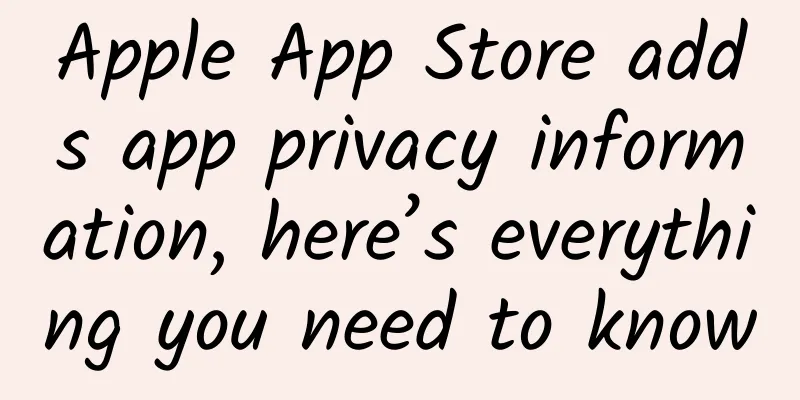Apple App Store adds app privacy information, here’s everything you need to know

|
In recent years, various problems caused by privacy leaks in mobile apps have emerged one after another, from address books being uploaded to the most recent mobile phones being implanted with Trojans when they leave the factory. Consumers may be harassed by marketing accounts all day long, or suffer serious property losses. The privacy security of mobile phones has received more and more attention from consumers. On December 15, Apple released iOS/iPad OS 14.3 and macOS Big Sur 11.1, introducing App "privacy" information in the App Store. Apple announced this news at the WWDC 20 Global Developers Conference in June this year. Users can see the "privacy" information directly on the product page of the app in the App Store. Apple's Privacy Guidelines Apple follows four privacy guidelines in the development of all its products. The first is the principle of data minimization. Apple uses various innovative technologies to implement various product functions while accessing the minimum amount of data possible. The second is the principle of intelligent processing on the device. Apple processes user data on the device as much as possible instead of sending it to the server, thereby protecting user privacy to the greatest extent. The third is the principle of transparency and control. Apple has always believed that apps should respect user privacy, so it has done a lot of protection in the operating system, so that customers can better understand what data is collected about them and have more control over their information. Finally, there is the principle of security protection, which is the foundation of everything Apple does in terms of privacy. Whether it is hardware, software or services, Apple follows this principle. We can see that the addition of app privacy information summary labels in the App Store follows Apple’s long-standing principles of transparency and control. What is the new App "Privacy" information? After this privacy policy update, when developers submit updates or new versions of apps on the App Store, they must submit privacy information to Apple. Every app developer in the world must answer the same privacy questions listed by Apple, including Apple itself. On the app product page in the App Store, app "privacy" information is divided into three categories: "Data used to track you", "Data associated with you", and "Data not associated with you". "Data used to track you" refers to user or device data collected by the app for targeted advertising or advertising measurement. "Data associated with you" refers to data associated with the user's identity through the user account, device or other details on the app. After the launch of the App Store "Privacy" information summary function, users can fully understand what types of private data developers may collect from them when deciding to download an app. In conjunction with other privacy control measures already launched by iOS, users can more carefully control what types of private data apps can access after downloading apps to their devices. The launch of this feature undoubtedly takes consumer privacy protection to a higher level. When asked how to deal with the possible reduction in advertising revenue, Apple said that the Safari Intelligent Tracking Prevention feature previously launched on iOS did not actually affect advertising revenue. For the app tracking prevention feature launched this time, developers must obtain user permission before tracking, which is essentially the same as the previous iOS addition of the need to obtain user permission to obtain microphone permissions. In fact, developers do not need to increase their workload or change their business model because of the addition of such a new privacy feature. Developers can complete the app privacy information check in the form of a submission list without even updating the app. Apple's App Store has always been known for its rigorous review of app permissions. In terms of user privacy, as early as iOS 10, Apple added pop-up windows requesting authorization to connect to the Internet, etc. In iOS 13, users can erase the metadata of photos when sending pictures to prevent their privacy from being leaked. In iOS 14, when an app uses the microphone or camera, the top status bar will display yellow and green solid dots respectively, and users can also blur the location information of the app. I believe that with the addition of the "privacy" information function of the App Store app, both users and developers can benefit from Apple's more complete "rules of the game." |
<<: WeChat cracks down on websites forcing users to click to read the full text
Recommend
How to choose Android architecture mode
1. Introduction I have to sigh that the architect...
4 tips to enhance article resonance and create popular articles!
If you want an article on a public account to go ...
Methods and strategies for operating sweepstakes activities!
This article will focus on the question of "...
Lawyer mini program development functions, how much does it cost to develop a lawyer legal consultation mini program?
Recently a friend consulted me and wanted to make...
When doing fission activities, how can we continuously obtain seed users?
There are many techniques for acquiring seed user...
Always a supporting role, but with the aura of a protagonist! The legend of the "egg-shaped car"
Isetta on display in the BMW Museum. (Photo provi...
Refined operation model, taught you step by step!
In this article, we will talk about how to review...
Tutorial on using TensorFlow on iOS (Part 1)
Before using deep learning networks for predictiv...
A must-read before meals! These 6 diseases are caused by overeating! Do you dare to eat more after reading this?
As the saying goes, "Eat until you are 70% f...
Youku Tudou's transformation puzzle: 1.77 billion yuan in cumulative losses in four years after listing
It is reported that the video traffic of Youku an...
The screen is full of rain, rain, rain! Heavy rain is coming to the south. Please check the guide for self-help in rainstorm and flood disasters!
The Central Meteorological Observatory issued a b...
How to build a drainage fission channel from 0 to 1?
This article is compiled from the open course joi...
Which matching mode is best for Baidu bidding promotion?
New friends who are doing bidding promotion will ...
Android and Chrome OS become friends
[[119829]] This summer's Google I/O was almos...









